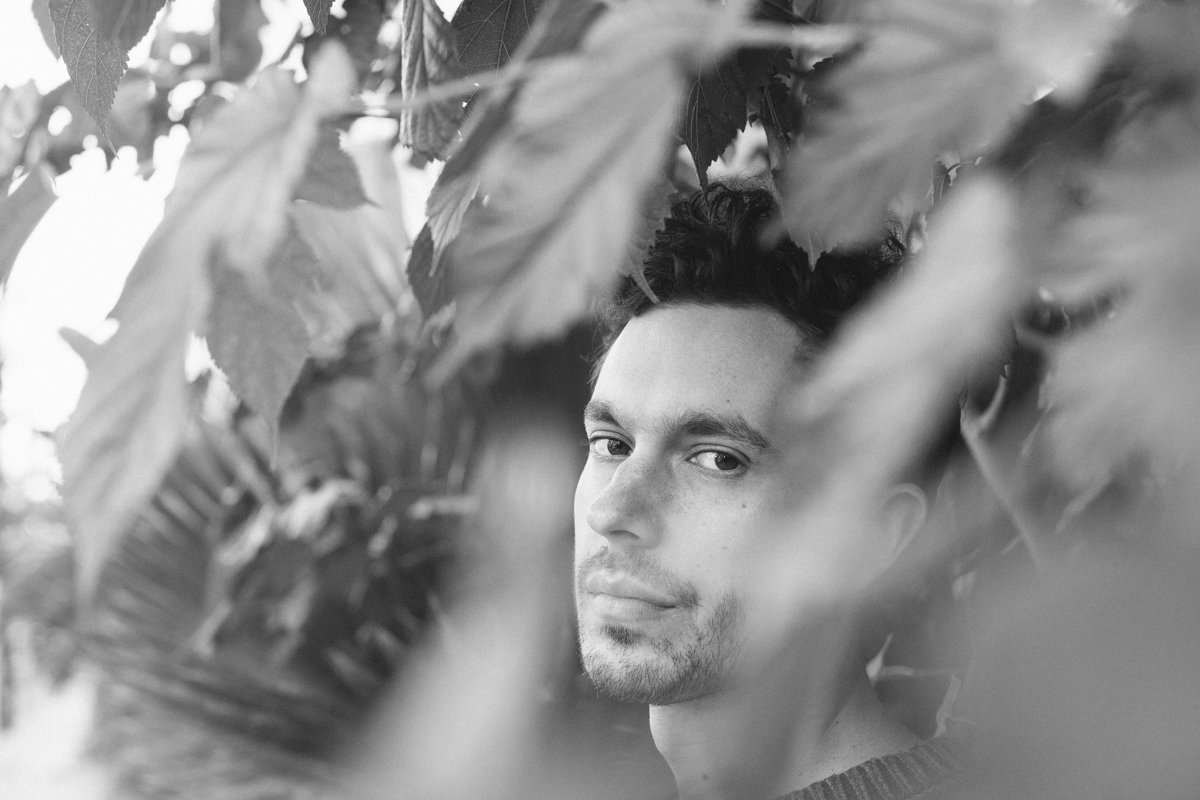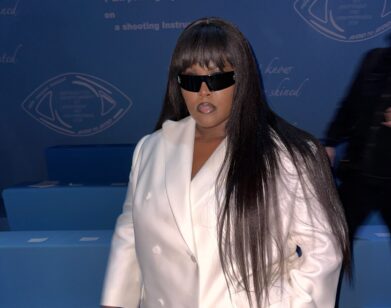Khushi and James Blake Debate the Philosophical Merits of Diplo’s Instagram Caption

Khushi. Photo courtesy of Parsons.
For Kalim Patel, the release of his debut album, Strange Seasons, is an especially big deal. The British-born producer, who performs under his childhood nickname Khushi, spent a total of ten years putting the record together. During that time, while Patel painstakingly crafted the album —the majority of which he did inside of a shed in East London—he also struck up a friendship with the musician James Blake, who invited him to Los Angeles to help produce his 2019 Grammy-winning album Assume Form. Patel, who toured with Blake in support of the album, was so taken with the city’s can-do spirit that he decided to stick around, emerging from the tinny, cramped confines of his workplace to finally release Strange Seasons, a swift-moving, tender collection of introspective ballads drenched in a lush electronic patina. Last week, Patel reconnected with Blake to discuss their approaches to making music, the psychological effect of Los Angeles, and the philosophical meaning behind Diplo’s latest Instagram caption.
__ __ __
JAMES BLAKE: Shall I start with some questions? I’m not a journalist, so you’re going to have to work with me here.
KHUSHI: That’s very awkward, James. Just give it your best shot and I’ll try and dignify your shit questions with some good answers.
BLAKE: Did you wait ten years to put this record out so that we would then eventually meet and I would end up mixing it?
KHUSHI: Busted.
BLAKE: Okay.
KHUSHI: Basically Jameela [Jamil, Blake’s girlfriend] and I go way back, and she said to me, “Your music isn’t ready yet, but just give me a bit of time, and I’m going to lure James Blake into a relationship, and then over time, I’m going to convince him to mix your album.” I actually had the album ready like ages ago, but we were basically playing this long game. It worked surprisingly well.
BLAKE: Once your album is out, is Jameela going to leave me?
KHUSHI: We said if you mixed the second album you get, like, another year.
BLAKE: For free?
KHUSHI: For free. After that there’s some charges and stuff, but it’s on the provision that you don’t write another album about her because she’s starting to find that a bit embarrassing. But I was like, “Come on Jameela, for my sake, stick in there for one more album.”
BLAKE: Well, that’s good news. I have some other questions. How many years do you expect Warner to wait for your next record, and do you think they will?
KHUSHI: It takes me ten years to write an album so I hope they’ll hang in there. Ask me in ten years.
BLAKE: Do you think that your process has sped up with the record you just put out? Or do you think music just takes a lot of time to do?
KHUSHI: It depends. It can happen both ways and sometimes, for certain people, you get the more Radiohead-y, Frank Ocean-style of approach, where things will take ages. And then sometimes you hear the White Stripes made some of their amazing albums in two weeks.
BLAKE: I’ve witnessed you make music in, like, a day. It’s almost like you’ve been able to do that for quite a while, but you just needed to make sure this one was absolutely perfect before you put it out.
KHUSHI: I think there was a bit of added incentive and fear in terms of wanting to perfect it, because it was my first one, and I’d dreamt for so long of making this album and wanting it to be everything I’d ever dreamt of.
BLAKE: Now that you’ve moved to L.A., is the shed a sort of geographical place or is it a mind-state that you can transport wherever you go? Is there enough room in it for collaborators and, if so, who would you invite in?
KHUSHI: The shed is a state of mind and you can definitely take it with you. I do enjoy locking myself away, but one of the wonderful things about you getting involved was that it was great letting another person in and getting that perspective and a new release of energy and ideas.
BLAKE: I thought that you were surprisingly open to ideas. I kind of expected you to be the control freak and it turned out you weren’t.
KHUSHI: That’s good to hear.
BLAKE: Well, not as much as I thought you were, anyway.
KHUSHI: Still a bit of a control freak, but not a total monster. Working on your music, you’ve also been extremely open to ideas, which I was very inspired by.
BLAKE: Well, they were brilliant ideas.
KHUSHI: You came in at a difficult time, because the album was almost fully-formed, but just needed those final twists, and that can be a delicate stage to come in, because the ideas have to fit with what already exists.
BLAKE: Your album was very sensitive. I identified with the sound of your music, just from a spiritual place. It chimes quite well with my own vulnerability and sensitivity. Do you find it scary to be that vulnerable on a record, as a man? And have you felt any pressure to limit your sensitivity or toughen up your sound?
KHUSHI: There was that time you told me to stop being such a sad boy. Such a coward. That was difficult, but that was probably the main time I felt pressure from someone. You told me just to sort of pull myself together, to man up.
BLAKE: When I told you to stop being a pussy?
KHUSHI: Yeah. But apart from that, everyone’s been really supportive.
BLAKE: I wonder how well this is going to come out in print. I’ve just watched your “Coldhearted, Lately” video. It’s really fun. How did you feel shaving your head after never having done that?
KHUSHI: It was one of the most exhausting days of my life. It was a 14-hour shoot on three hours of sleep, and by the end, I just felt like my sense of identity was completely scrambled. I’d never dyed my hair or cut it that short, so to do it twice in one day, and then go straight on camera and perform was a lot. The album took me a while, and I’d perfected it over years behind the scenes, whereas with this video, you’re kind of learning in public, because you’ve just got to go for an idea and then create it and then hope it turns out the way you want it to.
BLAKE: The music takes a lot of time and you get to perfect it, and then, the video you have way less control over and it happens in a day, basically.
KHUSHI: Exactly. And you can make loads of rubbish songs on your own, and just never play them to anyone. Whereas with a music video, you have to commit to an idea, and then it has to be budgeted and paid for and made.
BLAKE: We’ve bonded over moving to L.A. What is your favorite thing about L.A., apart from spending a lot of time with me?
KHUSHI: It’s very clichéd to say the weather, but coming from a rainy country, that does feel great. You’ve got the combination of city and nature, a lot of hilly areas, mountains. You’re only a couple of hours away from Joshua Tree and then you’ve got Yosemite. There’s a lot of forward-moving momentum and energy here. A lot of people are trying to make something happen or dreaming in some way, and that can be quite inspiring.
BLAKE: Do you feel the subject of your songs changing as you spend more time here?
KHUSHI: Not yet. I’ve only been in L.A. for eight months, and one of the songs I wrote was, “I Know,” which is about mental health and the people close to you—it’s not necessarily the sunniest, Californian vibe, but maybe that’ll seep through in the years to come. Have you found that it’s changed your music?
BLAKE: I think the natural mental evolution leads to different subjects. It’s a different evolution than I would have had, had I been in London this whole time. I think it’s probably led to talking about different things within mental health or within a city where a lot of people are very conscious of that, and quite intent on working on themselves. There’s a big mental health awareness here, which may have contributed to me investigating that more, and therefore writing about what I was investigating. Do you think being a part of Strong Asian Mothers has influenced your music?
KHUSHI: Being in Strong Asian Mothers helped me fall in love with performing, because it was such a fun band to play live in. It helped me find myself on stage, and realize that you can go one of two ways. You can be on stage, but on some level, hiding; and you can be on stage and fully engaging and fully facing and being seen and connecting. Strong Asian Mothers helped me discover what the latter felt like.
BLAKE: We have this greeting, basically, when we greet each other we press our foreheads together. Why does it feel so good?
KHUSHI: I think part of the answer is that we don’t regularly press our foreheads to other people’s foreheads. It’s not a common thing to do. I would highly recommend it to everyone and anyone because it does feel nice and I can’t explain why. Sometimes I press it to lamp posts, and sometimes, when I’m drinking glasses of water, I press the glass of water to my forehead. Sometimes I press it to the floor if no one’s looking.
BLAKE: Do you remember much of contributing to [Blake’s 2019 album] Assume Form? Because I think at the time you were also finishing your own record.
KHUSHI: I wrote most of Assume Form, didn’t I?
BLAKE: Yeah, it was mostly just writing the entire thing.
KHUSHI: I do remember that, now that you mention it.
BLAKE: One of the things that I was very impressed by when we started working together was how clearly you see structure and how you are able to finesse the dynamic contours of songs. I’d say you were instrumental in helping me figure out some of the song structures and the arrangements on a few of the tracks, the ones you’re credited on. Do you plan on doing more of that for other people?
KHUSHI: I would like to do that. I find myself naturally obsessed with structure. Because when you get it right it’s such a beautiful thing.
BLAKE: It feels like a puzzle and eventually we crack it and feel really good.
KHUSHI: It’s quite addictive, and it can sometimes be agonizing because you can’t figure it out, but then it’s also really great when you do figure it out and you get that sense of peace with the whole track.
BLAKE: Do you think we need that peace, as writers and creative people, or do you think that if we didn’t bother trying to write songs in the first place, we could achieve that peace in other ways?
KHUSHI: To quote Diplo, he posted on his Instagram earlier today how if he ever found perfect peace, that might be good in terms of his relationship with the work, or finding harmony with the world. But it was also his sense of always wanting to do more that drove him creatively. He ended it by saying, “I hope I never find contentment.” I think it’s possible to strive forward and appreciate things in the moment, but also to want to do more. The less healthy thing might be this constant compulsion, this gnawing sense of, “I haven’t done enough.” The more healthy way of moving forward is, “Doing this gives my life meaning and shape and I love what I’ve made, and I’m looking forward to making more in the future.” It doesn’t necessarily mean staying still, does it?
BLAKE: No, it doesn’t. I think that’s the logical fallacy that justifies chaos. For example, if you’re in a relationship where you feel genuinely peaceful, that’s just one thing in your life that’s covered. You don’t have to then just stop in all other areas. Just because you’re not feeling intense anxiety about that, it doesn’t mean that you’re not going to feel anxiety about other things. And also, why would you want to? Forward momentum isn’t mutually exclusive from peace.
KHUSHI: Moving forward with peace. Album number two.
BLAKE: We can’t really avoid moving forward, can we? We’re literally traversing space-time at a certain rate, and there’s nothing we can do about it. And if we want to live integrally and we have ambitions, then we’re going to need to pursue those ambitions. Otherwise you’ll be repressed and ultimately discontented. I don’t think Diplo expected that Instagram post to be unpacked in the way we have.
KHUSHI: Two hours after he posted it.
BLAKE: I don’t think he wrote that thinking this is going to be analyzed within an inch of its life. He probably just thought, “I’m not really that content, but I’m creative and I’m driven.” And he wrote it down the way he did, but ultimately, there are holes in it, if I’m honest.
KHUSHI: You’re going to start some big beef.
BLAKE: Love and respect to Diplo, but I do disagree. But then again, he’s saying it for himself. He’s not trying to speak for me or everyone else. I think when you find contentment, maybe that’s the perfect harmony with the world. But I never do—I always feel like I could do more. I want contentment and creativity and peace and to move forward, all at the same time. I also think his Instagram post bleeds into the myth about depression being necessary for creativity, and I don’t think it necessarily is. I think it makes it harder to be creative. It might give you, necessarily, an addiction to work, but that doesn’t make you more creative. Creativity is different to work rate, and I think that is potentially a topic that people in, especially in America or England, I feel like work rate and productivity and creativity are all almost bundled together as if they’re the same thing, but they’re really not.
KHUSHI: That’s one thing I’ve learned from my album process—trying to work with as much joy as possible—because that’s often when things happen quickest. Not because you’re forcing yourself to do it, but because you’re tuned into natural pleasure and a natural pull towards this thing that you can’t help but do.
BLAKE: I think that the amount of work that a lot of creative people put into their craft, it displaces some of the time that they could be spending on actually figuring out why they are unhappy. I had to stop making music so much and working so much and traveling so much to figure out what I was feeling. I was writing about the same stuff over and over and over again. I was stuck on a loop.
KHUSHI: Yeah, it wasn’t that you were cracking up.
BLAKE: No, I wasn’t gaining much creative ground, I was just talking about the same old things. And I think I realized I was stuck and I needed to un-stick myself and working hard wasn’t doing that. I’m wondering for the purposes of this interview, what do you do for self-care outside of making music?
KHUSHI: I press my forehead to lamp posts. That’s mainly it. Lamp post therapy. That was a good question. As well as pressing my forehead to various things, I also value relationships with people. Balancing that with music and not seeing the two as in competition with each other.






